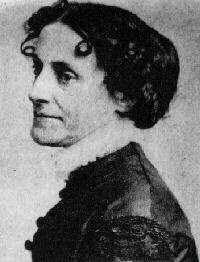

"Slave power crushes freedom of speech and of opinion. Slave power degrades labor. Slave power is arrogant, is jealous and intrusive, is cruel, is despotic, not only over the slave but over the community, the state." -- Elizabeth Van Lew
Elizabeth Van Lew, born October 12, 1818, in Richmond, Virginia, she was the oldest of three children born to John Van Lew, a successful Richmond hardware dealer, and Elizabeth “Eliza” Baker, daughter of Philadelphia mayor Hilary Baker. The Van Lews lived lavishly in an elegant three-and-one-half story mansion atop Church Hill outside of Richmond. They also owned a farm opposite City Point where crops were grown in fields worked by a dozen slaves owned by the Van Lews. That farm would later become an integral part of Elizabeth’s Richmond spy ring. Elizabeth Van Lew was educated in a Philadelphia Quaker school, where she became an abolitionist. When she returned to her family's home in Richmond -- where they were among the wealthiest and most socially prominent families -- she convinced her mother to free the family's slaves after the death of her father.
After the war started, she openly supported the Union. She took items of clothing and food and medicine to prisoners at the Confederate Libby Prison and passed information to U.S. General Grant, spending much of her fortune about [$10,000] to support her espionage. She may also have helped prisoners escape from Libby Prison. To cover her activities, she took on a persona of "Crazy Bet," dressing oddly; she was never arrested for her spying.
One of the Van Lew freed slaves, Mary Elizabeth Bowser, whose education in Philadelphia was financed by Van Lew, returned to Richmond and Elizabeth Van Lew helped get her employment in the Confederate White House. As a maid, Bowser was ignored as she served meals and overheard conversations. She was also able to read documents she found. Bowser passed what she learned to fellow slaves, and with Van Lew's aid, this valuable information eventually made its way to General Grant.
After the war, Grant appointed Van Lew as postmistress of Richmond and she was largely shunned by her neighbors. She had spent most of her money in her pro-Union activities, and, although she stayed in the family mansion until her death on September 25, 1900, she died in poverty, living only on an annuity from the family of a Union soldier she had helped.
